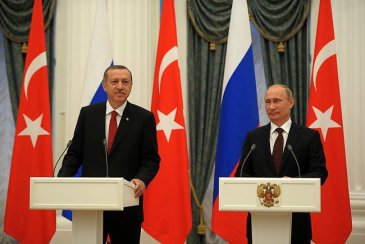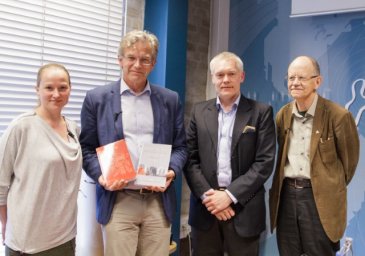Tuesday 6 June A U.S. Federal Bureau of Investigation (FBI) official is providing forensic assistance in connection with the ongoing trial related to the Terrain Hotel attack in July 2016. The trial has been adjourned until 20 June. Wednesday 7 June Al Jazeera video-report on Ana Taban artists “Young artists hope art can relieve suffering… Read more »
This Week in South Sudan – Week 22
Monday 29 May General Frank Mushyo Kamanzi from Uganda arrived in South Sudan to assume his position as the new UNMISS Force Commander. Alleged clashes between government soldiers and SPLA (IO) in Nasser town, Upper Nile State. Tuesday 30 May The military court prosecution against 13-20 SPLA soldiers commenced in Juba, in what is considered… Read more »
The Kurdish Peace Process in Turkey and Ontological Insecurity
From 2009 to 2015, Turkey’s Kurdish issue has been marked by successive initiatives aiming to end violence. However, following the June 2015 elections in Turkey, the peace process abruptly came to a halt, with the conflict escalating almost on a daily basis with armed confrontations between the PKK and the Turkish military and police forces…. Read more »
An overview: South Sudan’s civil war
Note to the reader: This blog post is intended for readers who desire a short introduction to current affairs in South Sudan. The text is an adaptation of a brief originally written in Norwegian and titled “Sør-Sudan: fra fest til katastrofe”. That brief is intended for a secondary school audience and was published in May… Read more »
This Week in South Sudan – Week 21
Monday 22 May The Guardian op-ed by Payton Knopf, former coordinator of the UN Panel of Experts on South Sudan: “If Trump does nothing, 50% of South Sudan’s population could soon be gone” President Salva Kiir declared a unilateral ceasefire and promised to release political prisoners. However, such a ceasefire is unlikely to hold… Read more »
Turkey’s Turn Toward Russia
Despite tensions over Syria, Turkey is increasingly turning to Russia to secure its foreign and domestic policy needs.

Meeting between Prime Minister of Turkey Recep Tayyip Erdogan and President of Russia Vladimir Putin in Moscow. Photo: Russian Presidential Press and Information Office / Wikimedia Commons
Though anticipated, the May 9 announcement by the Donald Trump administration that the United States would arm fighters of the Kurdish People’s Protection Units (YPG) in preparation for an advance on the Islamic State stronghold of Raqqa in Syria brought a swift and angry response from Turkey.
Demanding a policy reversal, Minister of Foreign Affairs Mevlut Cavusoglu noted ominously that any arms obtained by the YPG were a direct threat to Turkey — strong words from one NATO ally to another.
For Turkey, U.S. support for the Kurdish Democratic Union Party (PYD) in Syria and its armed wings, the YPG and the Women’s Protection Units (YPJ), is framed domestically as a deliberate effort to strengthen Turkey’s perceived internal enemy, the Kurdistan Workers’ Party (PKK). This fallout with the United States benefits Russia. Since the July 15 coup attempt in Turkey, Russian President Vladimir Putin has been stepping in to capitalize on the worsening Turkish–American relationship, reviving the prevailing Western concern over “losing Turkey.”Read More
“Fake Science” Has Arrived
How did we get into a situation where “the press is lying” and “research is rubbish”?

Banner at the March for Science, Washington, D.C. Photo: becker1999 @ Flickr
Society is now experiencing a “storm of distrust” that is “powerful and unpredictable”, with growing resistance to established institutions, if we are to believe the 2017 Edelman Trust Barometer, published in January. This distrust also affects research.
Climate researchers have long encountered distrust, but researchers in other fields – particularly fields relating to immigration and health – are also encountering growing scepticism. Their research is often criticized on ideological or political grounds.Read More
This Week in South Sudan – Week 20
Monday 15 May UN agencies increased their 2017 appeal for South Sudan to US $1.4 billion in order address what has become the world’s fastest growing refugee crisis. The UN Security Council (UNSC) reduced the UN Interim Force for Abyei (UNISFA) and warned it may withdraw its support to the Joint Border Verification & Monitoring… Read more »
The East Asian Peace
The 6-year East Asian Peace (EAP) program at Uppsala University led by Stein Tønnesson of PRIO and Uppsala University has been undertaken in a period with increased uncertainty about peace and stability in East Asia.
China’s rise and increased rivalry in the region has made stability in East Asia the most important topic in current international affairs, and the content of the EAP program even more relevant. On May 9th, two books from this research program were launched at PRIO. One is a monograph by the program director, Stein Tønnesson, Explaining the East Asian Peace, the other a volume edited by Elin Bjarnegård & Joakim Kreutz, Debating the East Asian Peace. I am very grateful for the invitation to comment on these two books.

Book launch. Marte Nilsen, Stein Tønnesson, Jo Inge Bekkevold & Nils Petter Gleditsch. Photo: Ebba Tellander / PRIO
The editors of the anthology Debating the East Asian Peace provide three overarching conclusions.
- First, that East Asia has maybe not been that peaceful after all, depending on how you define peace.
- Second, the current peace is shallow.
- And third, threats to the current peace can come from within nations as well as from interstate relations.
This Week in South Sudan – Week 19
Monday 8 May The Government of South Sudan (GoSS) has put the National Dialogue process on hold after the steering committee failed to reach a quorum, as appointed members have not yet reported to duty. The Guardian: “Juba in the spotlight: ongoing turmoil in the world’s youngest capital” Tuesday 9 May Unknown gunmen attacked Taban… Read more »